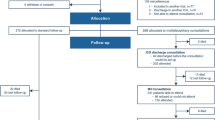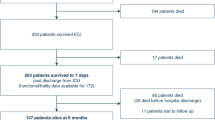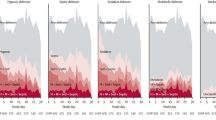Abstract
Acute decompensated heart failure is a significant source of morbidity and mortality in the USA. It is the most common reason for admission in the Medicare population and the greatest cause of hospital readmission in both medical and surgical patients. As many of these readmissions are considered preventable, providers and hospital systems are seeking novel strategies to reduce rehospitalization. Several specific interventions have been shown to decrease readmission for heart failure. However, these are typically narrow in scope, focusing on one aspect of patient care and providing a one-size-fits-all approach. We review the data and propose integrating some of these interventions into a comprehensive patient-centered model that is organized into six categories: quality of medical management, early reassessment, health literacy, neuropsychological status, financial means and functional status. By screening for deficiencies in each of these categories, providers and hospital systems can use resources more efficiently to make targeted interventions to improve health outcomes and mitigate readmissions.


Similar content being viewed by others
References
Heidenreich PA, Trogdon JG, Khavjou OA, Butler J, Dracup K, Ezekowitz MD et al (2011) Forecasting the future of cardiovascular disease in the United States: a policy statement from the American heart association. Circulation 1(123):933–944
Roger VL, Go AS, Lloyd-Jones DM, Benjamin EJ, Berry JD, Borden WB et al (2012) Heart disease and stroke statistics–2012 update: a report from the American heart association. Circulation 3(125):e2–e220
Jencks SF, Williams MV, Coleman EA (2009) Rehospitalizations among patients in the medicare fee-for-service program. N Engl J Med 360:1418–1428
Centers for Medicare and Medicaid Services (CMS), HHS (2013) Medicare program; hospital inpatient prospective payment systems for acute care hospitals and the long term care hospital prospective payment system and Fiscal Year 2014 rates; quality reporting requirements for specific providers; hospital conditions of participation; payment policies related to patient status. Final rules. Fed Regist 78(160):50495–51040
Kociol RD, Liang L, Hernandez AF, Curtis LH, Heidenreich PA, Yancy CW et al (2013) Are we targeting the right metric for heart failure? Comparison of hospital 30-day readmission rates and total episode of care inpatient days. Am Heart J 165(987–994):e1
Eapen ZJ, Reed SD, Li Y, Kociol RD, Armstrong PW, Starling RC et al (2013) Do countries or hospitals with longer hospital stays for acute heart failure have lower readmission rates?: Findings from ASCEND-HF. Circ Heart Fail 1(6):727–732
Patient Protection and Affordable Care Act (2010) Pub. L. NO. 111-148, §2702, 124. Stat 119:318–319
Retrum JH, Boggs J, Hersh A, Wright L, Main DS, Magid DJ et al (2013) Patient-identified factors related to heart failure readmissions. Circ Cardiovasc Qual Outcomes 1(6):171–177
Ross JS, Mulvey GK, Stauffer B, Patlolla V, Bernheim SM, Keenan PS et al (2008) Statistical models and patient predictors of readmission for heart failure: a systematic review. Arch Intern Med 14(168):1371–1386
Kociol RD, Peterson ED, Hammill BG, Flynn KE, Heidenreich PA, Piña IL et al (2012) National survey of hospital strategies to reduce heart failure readmissions: findings from the get with the guidelines-heart failure registry. Circ Heart Fail 1(5):680–687
Yancy CW, Jessup M, Bozkurt B, Butler J, Casey DE, Drazner MH et al (2013) 2013 ACCF/AHA guideline for the management of heart failure: a report of the American College of Cardiology Foundation/American Heart Association Task Force on Practice Guidelines. J Am Coll Cardiol 15(62):e147–e239
Gattis WA, O’Connor CM, Gallup DS, Hasselblad V (2004) Predischarge initiation of carvedilol in patients hospitalized for decompensated heart failure. JACC 43:1534–1541
Mehta RH, Rogers JG, Hasselblad V, Tasissa G, Binanay C, Califf RM et al (2009) Association of weight change with subsequent outcomes in patients hospitalized with acute decompensated heart failure. Am J Cardiol 103:76–81
Kociol RD, Horton JR, Fonarow GC, Reyes EM, Shaw LK, O’Connor CM et al (2011) Admission, discharge, or change in B-type natriuretic peptide and long-term outcomes: data from Organized Program to Initiate Lifesaving Treatment in Hospitalized Patients with Heart Failure (OPTIMIZE-HF) linked to Medicare claims. Circ Heart Fail 4:628–636
Xue Y, Clopton P, Peacock WF, Maisel AS (2011) Serial changes in high-sensitive troponin I predict outcome in patients with decompensated heart failure. Eur J Heart Fail 13:37–42
Goonewardena SN, Gemignani A, Ronan A, Vasaiwala S, Blair J, Brennan JM et al (2008) Comparison of hand-carried ultrasound assessment of the inferior vena cava and N-terminal pro-brain natriuretic peptide for predicting readmission after hospitalization for acute decompensated heart failure. JACC Cardiovasc Imaging 1:595–601
Fonarow GC, Abraham WT, Albert NM, Gattis Stough W, Gheorghiade M, Greenberg BH et al (2007) Influence of a performance-improvement initiative on quality of care for patients hospitalized with heart failure: results of the Organized Program to Initiate Lifesaving Treatment in Hospitalized Patients With Heart Failure (OPTIMIZE-HF). Arch Intern Med 167:1493–1502
Fonarow GC, Yancy CW, Albert NM, Curtis AB, Stough WG, Gheorghiade M et al (2008) Heart failure care in the outpatient cardiology practice setting: findings from IMPROVE-HF. Circ Heart Fail 1:98–106
Owan TE, Hodge DO, Herges RM, Jacobsen SJ, Roger VL, Redfield MM (2006) Trends in prevalence and outcome of heart failure with preserved ejection fraction. N Engl J Med 355:251–259
Connor SR, Pyenson B, Fitch K, Spence C, Iwasaki K (2007) Comparing hospice and nonhospice patient survival among patients who die within a three-year window. J Pain Symptom Manag 33(3):238–246
Shah MR, Flavell CM, Weintraub JR, Young MA, Hasselblad V, Fang JC et al (2005) Intensity and focus of heart failure disease management after hospital discharge. Am Heart J 149:715–721
Hernandez AF, Greiner MA, Fonarow GC, Hammill BG, Heidenreich PA, Yancy CW et al (2010) Relationship between early physician follow-up and 30-day readmission among Medicare beneficiaries hospitalized for heart failure. JAMA 5(303):1716–1722
Kyriacou DN (2005) Factors affecting outpatient follow-up compliance of emergency department patients. J Gen Intern Med 20:938–942
Coleman EA, Smith JD, Frank JC, Min SJ, Parry C, Kramer AM (2004) Preparing patients and caregivers to participate in care delivered across settings: the care transitions intervention. J Am Geriatr Soc 52:1817–1825
Jack BW, Chetty VK, Anthony D, Greenwald JL, Sanchez GM, Johnson AE et al (2009) A reengineered hospital discharge program to decrease rehospitalization: a randomized trial. Ann Intern Med 150:178–187
McAlister FA (2004) Multidisciplinary strategies for the management of heart failure patients at high risk for admission. JACC 44:810–819
Gohler A, Januzzi JL (2006) A systematic meta-analysis of the efficacy and heterogeneity of disease management programs in congestive heart failure. J Card Fail 12:554–567
Feltner C, Jones CD, Cené CW, Zheng Z-J, Sueta CA, Coker-Schwimmer EJL et al (2014) Transitional care interventions to prevent readmissions for persons with heart failure: a systematic review and meta-analysis. Ann Intern Med 3(160):774–784
Chaudhry SI, Mattera JA, Curtis JP, Spertus JA, Herrin J, Lin Z et al (2010) Telemonitoring in patients with heart failure. N Engl J Med 363:2301–2309
Koehler F, Winkler S, Schieber M, Sechtem U, Stangl K, Böhm M et al (2011) Impact of remote telemedical management on mortality and hospitalizations in ambulatory patients with chronic heart failure: the telemedical interventional monitoring in heart failure study. Circulation 3(123):1873–1880
Maric B, Kaan A, Ignaszewski A, Lear SA (2009) A systematic review of telemonitoring technologies in heart failure. Eur J Heart Fail 11:506–517
Lindenfeld J, Albert NM, Boehmer JP, Collins SP, Ezekowitz JA, Givertz MM et al (2010) HFSA 2010 comprehensive heart failure practice guideline. J Card Fail 16:e1–e194
Cline CM, Bjorck-Linne AK, Israelsson BY, Willenheimer RB, Erhardt LR (1999) Non-compliance and knowledge of prescribed medication in elderly patients with heart failure. Eur J Heart Fail 1:145–149
Van der Wal MH, Jaarsma T, van Veldhuisen DJ (2005) Non-compliance in patients with heart failure; how can we manage it? Eur J Heart Fail 7:5–17
Patel A, Parikh R, Howell E, Hsich E, Gorodeski E (2014) Mini-Cog performance: a novel marker of risk among patients hospitalized for heart failure. Poster presentation at challenges in acute decompensated heart failure. 64th annual american college of cardiology scientific sessions, Washington, DC, 29–31 March 2014.
Morrow D, Clark D, Tu W, Wu J, Weiner M, Steinley D et al (2006) Correlates of health literacy in patients with chronic heart failure. Gerontologist 46:669–676
Koelling TM, Johnson ML, Cody RJ, Aaronson KD (2005) Discharge education improves clinical outcomes in patients with chronic heart failure. Circulation 111:179–185
Berkowitz R, Blank LJ, Powell SK (2005) Strategies to reduce hospitalization in the management of heart failure. Lippincotts Case Manag 10:S1–15 quiz S16–7
Wright SP, Walsh H, Ingley KM, Muncaster SA, Gamble GD, Pearl A et al (2003) Uptake of self-management strategies in a heart failure management programme. Eur J Heart Fail 5:371–380
Powell LH, Calvin JE Jr, Richardson D, Janssen I, Mendes de Leon CF, Flynn KJ et al (2010) Self-management counseling in patients with heart failure: the heart failure adherence and retention randomized behavioral trial. JAMA 304:1331–1338
DeWalt DA, Schillinger D, Ruo B, Bibbins-Domingo K, Baker DW, Holmes GM et al (2012) Multisite randomized trial of a single-session versus multisession literacy-sensitive self-care intervention for patients with heart failure. Circulation 125:2854–2862
Schillinger D, Grumbach K, Wang F, Wilson C, Daher C, Leong-Grotz K, Castro C, Bindman AB (2003) PJ: physician communication with diabetic patients who have low health literacy. Arch Intern Med 163:83–90
White M, Garbez R, Carroll M, Brinker E, Howie-Esquivel J (2012) Is “teach-back” associated with knowledge retention and hospital readmission in hospitalized heart failure patients? J Cardiovasc Nurs. doi:10.1097/JCN.0b013e31824987bd
Song EK, Lennie TA, Moser DK (2009) Depressive symptoms increase risk of rehospitalisation in heart failure patients with preserved systolic function. J Clin Nurs 18:1871–1877
Lesman-Leegte I, van Veldhuisen DJ, Hillege HL, Moser D, Sanderman R, Jaarsma T (2009) Depressive symptoms and outcomes in patients with heart failure: data from the COACH study. Eur J Heart Fail 11:1202–1207
Morgan AL, Masoudi FA, Havranek EP, Jones PG, Peterson PN, Krumholz HM et al (2006) Difficulty taking medications, depression, and health status in heart failure patients. J Card Fail 12:54–60
Sherwood A, Blumenthal JA, Trivedi R, Johnson KS, O’Connor CM, Adams KF Jr et al (2007) Relationship of depression to death or hospitalization in patients with heart failure. Arch Intern Med 167:367–373
Jiang W, Kuchibhatla M, Clary GL, Cuffe MS, Christopher EJ, Alexander JD et al (2007) Relationship between depressive symptoms and long-term mortality in patients with heart failure. Am Heart J 154:102–108
Tsuchihashi-Makaya M, Kato N, Chishaki A, Takeshita A, Tsutsui H (2009) Anxiety and poor social support are independently associated with adverse outcomes in patients with mild heart failure. Circ J 73:280–287
O’Connor CM, Jiang W, Kuchibhatla M, Silva SG, Cuffe MS, Callwood DD et al (2010) Safety and efficacy of sertraline for depression in patients with heart failure: results of the SADHART-CHF (sertraline against depression and heart disease in chronic heart failure) trial. J Am Coll Cardiol 56:692–699
Angermann CE, Gelbrich G, Störk S, Fallgatter A, Deckert J, Faller H et al (2007) Rationale and design of a randomised, controlled, multicenter trial investigating the effects of selective serotonin re-uptake inhibition on morbidity, mortality and mood in depressed heart failure patients (MOOD-HF). Eur J Heart Fail 9:1212–1222
Krumholz HM, Butler J, Miller J, Vaccarino V, Williams CS, Mendes de Leon CF et al (1998) Prognostic importance of emotional support for elderly patients hospitalized with heart failure. Circulation 97:958–964
Wu J-R, Moser DK, Chung ML, Lennie TA (2008) Predictors of medication adherence using a multidimensional adherence model in patients with heart failure. J Card Fail 14:603–614
Frasure-Smith N, Lesperance F, Talajic M (1995) The impact of negative emotions on prognosis following myocardial infarction: is it more than depression? Health Psychol 14:388–398
Fiske A, Wetherell JL, Gatz M (2009) Depression in older adults. Annu Rev Clin Psychol 5:363–389
Gure TR, Blaum CS, Giordani B, Koelling TM, Galecki A, Pressler SJ et al (2012) Prevalence of cognitive impairment in older adults with heart failure. J Am Geriatr Soc 60:1724–1729
Vogels RL, Scheltens P, Schroeder-Tanka JM, Weinstein HC (2007) Cognitive impairment in heart failure: a systematic review of the literature. Eur J Heart Fail 9:440–449
Uthamalingam S, Gurm GS, Daley M, Flynn J, Capodilupo R (2011) Usefulness of acute delirium as a predictor of adverse outcomes in patients >65 years of age with acute decompensated heart failure. Am J Cardiol 108:402–408
Thanassoulis G, Karp I, Humphries K, Tu JV, Eisenberg MJ, Pilote L (2009) Impact of restrictive prescription plans on heart failure medication use. Circ Cardiovasc Qual Outcomes 2:484–490
Johnson ML, Petersen LA, Sundaravaradan R, Byrne MM, Hasche JC, Osemene NI et al (2009) The association of Medicare drug coverage with use of evidence-based medications in the Veterans Health Administration. Ann Pharmacother 43:1565–1575
Cole JA, Norman H, Weatherby LB, Walker AM (2006) Drug copayment and adherence in chronic heart failure: effect on cost and outcomes. Pharmacotherapy 26:1157–1164
Wolinsky FD, Smith DM, Stump TE, Overhage JM, Lubitz RM (1997) The sequelae of hospitalization for congestive heart failure among older adults. J Am Geriatr Soc 45:558–563
Gill TM, Allore HG, Gahbauer EA, Murphy TE (2010) Change in disability after hospitalization or restricted activity in older persons. JAMA 304:1919–1928
Schwarz KA, Elman CS (2003) Identification of factors predictive of hospital readmissions for patients with heart failure. Heart Lung 32:88–99
Belardinelli R, Georgiou D, Cianci G, Purcaro A (2012) 10-year exercise training in chronic heart failure: a randomized controlled trial. J Am Coll Cardiol 16(60):1521–1528
Bueno H, Ross JS, Wang Y, Chen J, Vidán MT, Normand S-LT et al (2010) Trends in length of stay and short-term outcomes among Medicare patients hospitalized for heart failure, 1993-2006. JAMA 2(303):2141–2147
Yu DSF, Thompson DR, Lee DT (2006) Disease management programmes for older people with heart failure: crucial characteristics which improve post-discharge outcomes. Eur Heart J 27(5):592–612
Allen LA, Hernandez AF, Peterson ED, Curtis LH, Dai D, Masoudi FA et al (2011) Discharge to a skilled nursing facility and subsequent clinical outcomes among older patients hospitalized for heart failure. Circ Heart Fail 4:293–300
Chen J, Ross JS, Carlson MD, Lin Z, Normand SL, Bernheim SM et al (2012) Skilled nursing facility referral and hospital readmission rates after heart failure or myocardial infarction. Am J Med 125(100):e1–e9
Acknowledgments
We would like to thank Karen Mack and Cindy Bither for their assistance with the preparation of the manuscript.
Conflict of interest
The authors have no financial disclosures to report.
Author information
Authors and Affiliations
Corresponding author
Rights and permissions
About this article
Cite this article
Sperry, B.W., Ruiz, G. & Najjar, S.S. Hospital readmission in heart failure, a novel analysis of a longstanding problem. Heart Fail Rev 20, 251–258 (2015). https://doi.org/10.1007/s10741-014-9459-2
Published:
Issue Date:
DOI: https://doi.org/10.1007/s10741-014-9459-2




